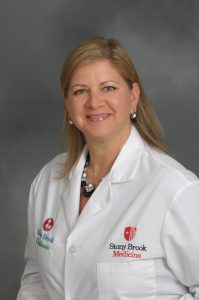Vaccines, sleep, exercise among pre-Thanksgiving tips from local doctors

The time between Halloween and Thanksgiving often involves lists.

Thanksgiving hosts make lists of people to invite, food to purchase, reminders of relatives who need to sit as far from each other as possible, and specialty items, like dairy-free, nut-free, gluten-free and sugar-free desserts.
This year, people should also consider adding healthcare steps to their holiday preparation, particularly as new COVID-19 variants and a host of respiratory viruses like the flu and respiratory syncytial virus, also known as RSV, threaten to put a damper on the holiday festivities or the days immediately after family gatherings.
Even as new COVID variants circulate in the area, cases of the flu have recently been climbing throughout the county, state and country.
As of the week ending Oct. 29, which is the most recent week for which the state and country produced data, Suffolk County reported 255 confirmed cases of the flu, which is up 86% from the previous week, according to the New York State Department of Health. Statewide, the number of cases reached 3,476 for the same week.
Dr. Christy Beneri, program director of Pediatric Infectious Diseases at Stony Brook Children’s Hospital, suggests that the “ideal time is now” to get COVID and flu vaccines. “It generally takes about two weeks for the immune system to show a response to the vaccine to provide protection,” which means that the clock is ticking to prepare immune systems for visits with friends and relatives who might be bringing unwitting viral passengers with them to the dinner table.
The Centers for Disease Control and Prevention recommends that people get a bivalent booster — the version from Pfizer/ BioNTech or Moderna that includes protection against some of the newer omicron variants — if it has been at least two months since their last COVID-19 vaccine or since their original booster.
Beneri urges residents to get both COVID and flu vaccines, which people can receive at the same time.
The effects of these combined shots may have increased side effects of flu-like illnesses, like fever, aches and fatigue, which generally lasts for about a day.
The CDC reported that observational studies show greater disease severity in patients with influenza and COVID than in patients with COVID alone.
As for ways to protect guests in people’s homes, Beneri explained in an email that no specific house filters are effective at reducing the spread of disease.
“Good air flow is important,” she wrote. “Leaving some windows cracked and telling guests to wear an extra layer” could reduce the risk of spreading viruses.
Beneri added that area medical facilities have seen patients with more than one respiratory virus.
“Having multiple viruses can lead to more severe disease and thus [the] need for hospitalization for supportive care,” Beneri added.
Treatment options currently exist for COVID and influenza, which is not the case for other respiratory illnesses. The NIH COVID-19 Treatment Guidelines suggested that there are no significant drug-drug interactions between the antiviral agents used to treat the flu and antivirals used to prevent or treat COVID.
While vaccinations may not completely prevent disease, they can help reduce severe disease and hospitalization, which is “especially important with the increase in other respiratory infections, such as respiratory syncytial virus,” she explained in an email.
Boosting immunity
In general, people can enhance their health by eating well, exercising and getting a good night’s sleep, Beneri said.
She also generally recommends a multivitamin.
The COVID-19 Treatment Guidelines Panel indicates that there is not enough evidence to support the use of additional supplements, such as Vitamin C, D or zinc in patients with COVID.
Beneri advised residents to review any supplement use with their doctors to avoid drug interactions and possible side effects.
At this point, the bivalent vaccine has improved effectiveness for the omicron strain based on the immune response, Beneri explained.
More data, however, is expected on the vaccine efficacy in the short and longer term with the new bivalent boosters, Beneri said.
Additionally, more data should be forthcoming on treatment options, which will also be important with anticipated new waves over the holidays and new variants emerging, she added.
Combined vaccine
Recently, Pfizer/ BioNTech said it was in phase one trials for a single vaccine that would provide immune protection against COVID and the flu.
Local doctors urged patience as the pharmaceutical company and the Food and Drug Administration review the results from these trials.
“Although there may be benefits with combination vaccines from a compliance perspective, we need to weigh that against the risk of safety and efficacy,” Dr. Sunil Dhuper, chief medical officer at Port Jefferson’s St. Charles Hospital, explained in an email.
The medical community needs to ensure that the combination is neither less immunogenic nor less effective than the singular vaccines on their own, he added.
“Safety and tolerability are other important concerns with combination vaccines,” Dhuper explained. He hopes the clinical trials will answer a host of questions related to immune response, efficacy, and reactogenicity, which refers to injection site pain, redness, swelling, fever headaches and other responses to the vaccination.






